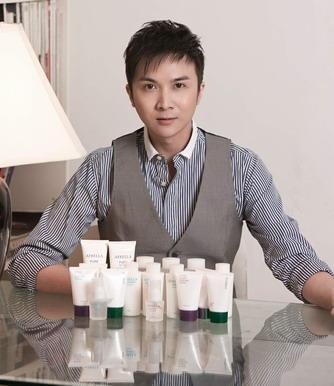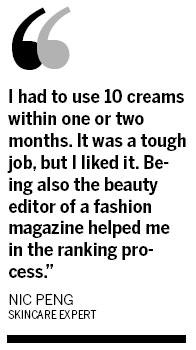
Nic Peng, known as "Brother Nic", has a huge fan base in many Chinese cosmetology websites. [Photo / Provided to China Daily]
Nic Peng knew that his hosts, a foreign cosmetic company, were in a spot of bother, as they did not have the right Chinese name for the skincare product they were launching. The company had initially thought of naming the product after the Chinese characters (pronounced you), or "oil".
But Peng convinced his hosts that it was better to rename the product as the character would be misinterpreted for a product that moistens the skin too much. Rather than have a bad impact on sales, Peng suggested that it would be better to call the product "jinghua", or "cream" in Chinese.
Known as "Brother Nic" in many Chinese cosmetology websites, Peng is a respected skincare expert on the Chinese mainland. His main job is to attend various launches and business meetings as a beauty adviser.

Nine years back, Peng was just another of the many Beijing netizens, who surfed the Internet and published short stories in various bulletin boards on skincare, the hottest topic for many young girls and office workers.
But what really rocketed him to fame was his ranking of the top 100 best skin creams. The ranking eventually found its way into some of the big beauty websites, and soon Peng had a huge fan following.
"I had to use 10 creams within one or two months. It was a tough job, but I liked it. Being also the beauty editor of a fashion magazine helped me in the ranking process," Peng says.
Enthused by the good response, Peng expanded his portfolio to writing blogs, answering questions, and giving cosmetics samples to his online friends.
But it took nearly a year for Peng to catch the attention of the biggies. In 2007, he received an invitation to attend an event conducted by Eau Thermale Avene, a French derma-cosmetic brand.
"It was then that I realized that I could make money by being an expert on the cosmetic industry," Peng says.
Leaving his job in 2008, Peng became a freelancer for many fashion magazines and wrote extensively on skincare products. At the same time, he also received several invitations to fashion parties and events, all of which enhanced his reputation.
In 2008, Peng's friends urged him to start his own cosmetic label. It was then that he realized that his popularity could bring in more money.
With an initial capital of 1 million yuan ($153,900), Peng entered the cosmetics business as a full-time player. His first step was to visit major cosmetics manufacturing locations like Tianjin and Guangdong province.
"During the trip, I realized that most of the cosmetic products were not so attractive to look at. They often came in ugly containers and packages," says Peng recalling a visit to a factory in Tianjin.
"I used to fail in mathematics, physics and chemistry, but now I have to learn these boring subjects," he adds, with a bittersweet smile.
On July 1, 2009 Peng launched his own range of cosmetics under the brand Afrella. The products are available through the company's official website and on China's biggest online retailer taobao.com.
Though Peng does not reveal the sales numbers, he says it is "quite satisfying so far". He is also working on setting up two boutique stores in Beijing and Shanghai.
Peng's success story has close parallels in that of Robin Niu, a celebrated skincare expert from Taiwan.
Unlike Peng who started from the Internet, Niu gained popularity in a different way. Early in 1999, he appeared in Taiwan cable channel FTV's live show, teaching the audience to make a facial mask from green gram, egg white and yogurt. It received good results and the channel's hotlines were constantly ringing all the time.
Niu soon started to write columns for fashion magazines and also published books on the subject. In 2002, he began to develop his own range of products.
Mainland fans began to notice him because popular entertainer Barbie Hsu published a beauty book The King of Beauty (Meirong Dawang) in 2004, recommending Niu's products.
In 2009, Niu's friends in Beijing invited him to create a face cream specially suited for Beijing's dry weather. Niu knew it was time to open his own company in Taipei and Shanghai.
Last year, he launched two labels: Naruko d'lux, which has products targeting the mainland consumers, and Naruko, which is available only in Taiwan. According to him, the weather in both markets is different and hence consumers should check the region before using the product. In October, he launched another brand called "ampm", which Niu described is more "medical".
He earned 80 million yuan from his three labels during the second half of 2010.
Both Niu and Peng are worried about one common thing. When their own labels were launched, most of the consumers were their fans.
Peng feels that most of these consumers are young, and do not have much purchasing capability, while his products are mainly priced from 49 to 149 yuan.
"My original plan was to create a high-end brand. Soon, I will launch another range for higher-end consumers," he says.
Peng and Niu are not the only people making a noise in the cosmetics market.
Markup artist Kevin Chou, who rose to fame through Taiwan's live show Prep+Prime on Woman, is frequently invited for many mainland fashion events. Perry Liu, who is Barbie Hsu and Dee Hsu's stylist, has opened his own PS Styling House in Sanlitun, Beijing.
"The Chinese market has its own special environment, wherein ordinary people can become experts, and start their own cosmetic labels. But there is always a question for them: to earn money, or to love this industry whole-heartedly?" Niu says.





